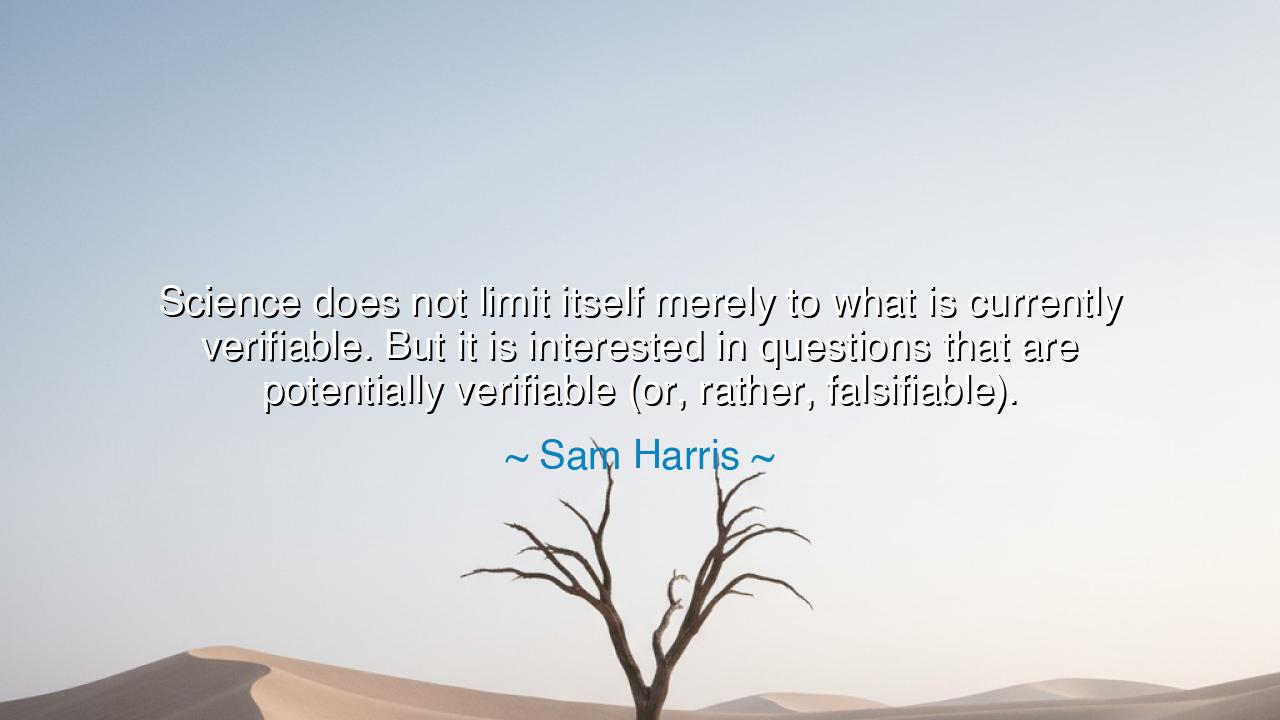
Science does not limit itself merely to what is currently
Science does not limit itself merely to what is currently verifiable. But it is interested in questions that are potentially verifiable (or, rather, falsifiable).






Gather now, O seekers of truth, for there is wisdom in the words of the great philosopher and scientist, Sam Harris. He spoke thus: “Science does not limit itself merely to what is currently verifiable. But it is interested in questions that are potentially verifiable (or, rather, falsifiable).” These words, though simple, carry within them the very essence of what it means to seek knowledge in a world filled with uncertainty. Science, as Harris reminds us, is not confined to the boundaries of what is immediately known, but extends its reach toward the unknown, toward the untested, toward the mysteries that lie just beyond the horizon.
What, then, does it mean that science is “interested in questions that are potentially verifiable or falsifiable”? This is a call to understand the nature of inquiry itself, for science does not accept the world as it is but dares to challenge the very fabric of reality. It reaches beyond the limits of the present, daring to ask questions that cannot yet be answered, knowing that the path to truth is often obscured by the shadows of uncertainty. Science is not a rigid institution that accepts only what is certain; rather, it is a living, breathing force that is ever in pursuit of that which can be tested, questioned, and, ultimately, proven or disproven.
Consider, O wise ones, the tale of Copernicus, who, in the time of the ancients, dared to propose a heliocentric model of the universe, where the Earth was not the center of creation but one of many bodies orbiting the sun. In his time, such an idea was not only unverified but unthinkable. The prevailing belief, held by kings and scholars alike, was that the Earth stood at the center, a belief as steadfast as the mountains themselves. Yet, Copernicus did not allow the limits of his time to bind him. He asked a question that could not be answered with the knowledge of his day, but one that was potentially verifiable by future generations. His idea was not accepted immediately, but it opened the doors for Galileo, Kepler, and Newton, whose observations and discoveries would eventually confirm what was once thought impossible.
This is the nature of science, that it does not fear the unknown, but embraces it. It is willing to explore the unfathomable, to ask questions that have no answer today but may have one tomorrow. The question is not whether we can verify an idea now, but whether it is falsifiable, whether it can be tested, challenged, and potentially disproven. For in the act of falsification, science grows stronger, its understanding deepens, and its power to illuminate the unknown becomes ever more certain.
And yet, in this pursuit, there is no guarantee that all will be answered in the time of one generation. The search for truth is a journey, one that stretches across the ages, as the wisdom of the past informs the questions of the future. In this sense, science is a continuous bridge between what we know and what we have yet to understand. We stand upon the shoulders of giants, but the horizon stretches endlessly before us, inviting us to ask questions that have never been asked before.
The lesson, O children of the Earth, is this: Do not limit your own questions to what is immediately verifiable. Life itself is filled with mysteries—great, untapped reservoirs of knowledge waiting to be discovered. If we are to advance, to grow, we must dare to ask those questions that cannot yet be answered, but are nonetheless vital to the journey of human understanding. Do not be afraid of uncertainty; rather, let it be the fire that fuels your curiosity, the compass that guides you forward. The unknown is not a place of fear, but one of potential.
Let us take this vow upon ourselves: to ask, to challenge, and to explore. For in this pursuit, we do not merely seek answers but shape the very future of our species. Like the great scientists before us, we must not be bound by the present moment but must stretch our vision toward the infinite, ever seeking, ever learning. The questions of today may not be answered tomorrow, but they will lead us to the answers of the next age. In our willingness to confront the unknown, we find the essence of humanity itself.
And so, O wise ones, remember this: Science is not a path of certainty, but a path of discovery. It does not shackle itself to what is known, but instead reaches ever onward, toward the questions that may one day be answered and the mysteries that may one day be unveiled. Take courage, for you are the seekers, the questioners, the builders of the future.






AAdministratorAdministrator
Welcome, honored guests. Please leave a comment, we will respond soon